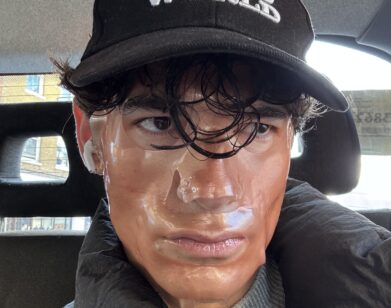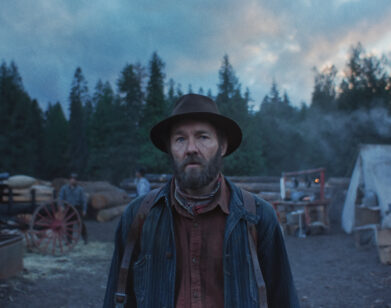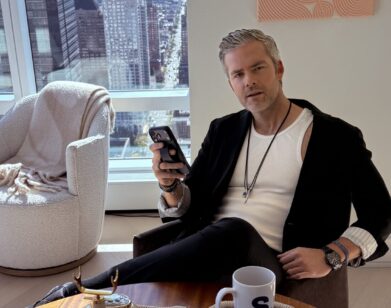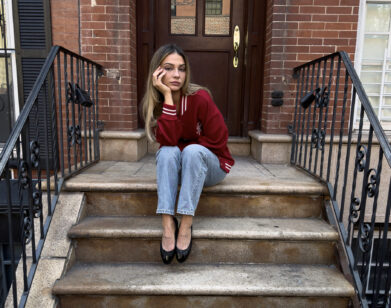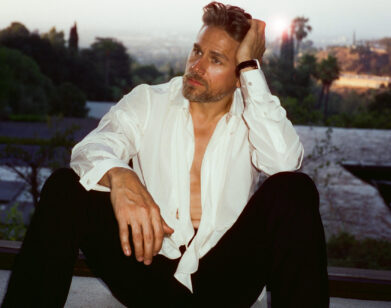Cate Blanchett and Fayssal Bazzi on the Timely Resonance of “Stateless”

Photo by Lucy Le Masurier.
Earlier this month, Netflix released Stateless, an Australian drama miniseries that traces the seemingly disparate experiences of an airline hostess (Yvonne Strahovski of The Handmaid’s Tale) fleeing a cult, an Afghan refugee (Fayssal Bazzi) fleeing persecution, and a young Australian father (Jai Courtney) in search of stable work. The trio’s lives converge in an immigration detention center in the middle of the Australian desert, revealing the nation’s dark history of imposing mandatory detention on immigrants who arrive on its shores without visas.
The project, executive produced by Cate Blanchett, the Australian national treasure and Goodwill Ambassador to the United Nations’s High Commissioner for Refugees, was no easy feat to realize. For Blanchett, who has worked for years to enact reform surrounding the Western world’s treatment of refugees, Stateless is a labor of love. The actor spent six years combatting heavy social pressure in her homeland in order to bring the project to life, and in the month since its release, the miniseries has generated a considerable reaction across the globe.
A major source of Stateless’s positive reception is Fayssal Bazzi’s portrayal of Ameer, a father of two who sacrifices himself to ensure his family is smuggled to safety. Bazzi’s visceral performance stems from first-hand experience: at just three-and-a-half years old, the actor fled the Lebanese civil war with his parents and embarked upon the endless journey of combatting racial prejudice in Australia, his adopted home. For Bazzi, Stateless was an opportunity to portray a three-dimensional character, not a pigeon-holed stereotype, and to act alongside former refugee detainees at the detention center where much of the series is filmed. Over just six episodes, Bazzi delivers a heartrending performance that has placed him at the center of a cultural conversation that often disregards the humanity of immigrant lives. Though he never managed to “tread the boards” alongside Blanchett (who makes a glittering cameo as a suburban cult leader), the pair are confident that there will be plenty of opportunities down the line.
To celebrate the show’s success, Blanchett hopped on Zoom with Bazzi to discuss everything from the experiences that inspire his craft to the glory of growing a full beard. —MARA VEITCH
———
CATE BLANCHETT: Oh, hello! Are you in Sydney?
FAYSSAL BAZZI: I am in Sydney. It is a crisp Friday morning, 6:30AM and there is nothing I would rather be doing than speaking to you.
BLANCHETT: He’s just done his workout, of course. I thought that the last time we spoke virtually, you were in Los Angeles. Are you time traveling right now? Are you space shipping?
BAZZI: I wish I could be.
BLANCHETT: Or were you pretending? Were you using one of those Zoom backdrops? You’re in Hong Kong one day and in Shanghai the next…
BAZZI: Yeah. You’ll see that today. I’m just going to keep changing locations after every question.
BLANCHETT: To the envy of millions. One gift that COVID has given us is that we get up earlier than we ordinarily do; although we’re actors, so we are used to getting up at ‘the dawn of crack,’ as they say.
BAZZI: I was actually trying to think of the last time I’d gotten up at this hour, and it was this time last year filming Stateless. I actually do love an early morning, especially when I’ve got something creative to do.
BLANCHETT: And also, I mean, I don’t want to sound like I’m working for Tourism Port Augusta, but the light on the Australian desert at that time of morning is something to behold. I do think it’s quite spectacular.
BAZZI: It is absolutely stunning. I think that was one of the major benefits of early mornings and late finishes on set. The sunrises and the sunsets just look incredible. The sun setting over the rocks. I can still picture it now. It takes me back.
BLANCHETT: You don’t go to Port Augusta for the cuisine, but—
BAZZI: Actually, Port Augusta has a pretty good roast chicken shop that Yvonne [Strahovski, Bazzi’s costar in Stateless] and I would visit most days for a chook, so before you go bad mouthing the cuisine, I think you’ve got to try their rotisserie chicken.
BLANCHETT: I think the catering on set by some of the refugee cooks was probably far better than the chook shop, but I’m not going to challenge you too quickly on that one. Before we launch into the tea, have you been okay? I mean, how are you holding up? These are bewildering and heartbreaking days.
BAZZI: I was in a weird position, where my plan for the rest of the year was to go to L.A. for a few months and try to get some management. I was going to do publicity for a movie I’ve got coming out. So, my whole year’s trajectory was away from home. I’ve really just had to change courses and reassess what I’m doing now. I’m not one to just sit at home, so it’s been a nice break, considering. I’m trying to look at the positives in everything. I am ready for work, whatever that may be. I’m ready to dive into something.
BLANCHETT: There’s been a monumental creative recalibration, hasn’t there? But I think if there’s any industry that’s going to emerge from this, it’s going to be the creative industries, because we’re so used to dealing with challenges and finding different ways.
BAZZI: Absolutely.
BLANCHETT: You have such an extensive background in theater. You’re like me, a theater animal. You and Marta [Dusseldorp] were unable to join us in Berlin when we launched Stateless to a European audience because you were on stage with Deep Blue Sea. What do you love most about performing for a live audience?
BAZZI: I guess it’s the fact that you’re creating every night, but every night is different. It’s a singular experience that you’re sharing with everyone in the audience and in the production. The ability to take people away from their daily lives and transport them somewhere in telling a story. I love doing screen work, but you just don’t get that buzz that you do from a theater crowd. I cannot wait until we’re back in theaters again at full force. That’s going to be my first port of call, just sitting in an audience and being one with the hive mind being affected by the artist on that stage.
BLANCHETT: There’s kind of a mystical, ancient call to gather with people. I think that’s what everyone I’ve spoken to is really missing. It’s a live experience. And we’ve all survived on being told stories with streaming, which is great, but you can’t supplant that live connection that you get between actor and audience, between story and audience. Do you find that, as someone of Lebanese and Syrian heritage, that there’s a more elastic sense of what is possible within theater than the more literal casting that happens in film?
BAZZI: Absolutely. I think with theater, if I walk on stage, I’m whatever I say I am. In the screen realm, sometimes producers and companies overthink it and go, “Oh, this’ll never happen.” One of my favorite experiences was watching August: Osage County on Broadway in 2012, I think it was. They had an African American woman as the matriarch. The rest of the cast were white and you don’t even think twice about it. Theater gets audiences into the habit of accepting anything in a story, because they want to be transported. They don’t really care about the politics.
BLANCHETT: The imaginative space is so large in theater that it transcends the literal. I think that’s often the struggle one has in television as well, because it’s all about the believability of the narrative. And so that sometimes it can tend towards the literal. So, casting opportunities have, probably up until relatively recently, been very literal and small.
BAZZI: Yeah, that’s been my experience coming up in the industry. I mean, I’ve been a professional actor now for 17 years and when I first started it was right after 9/11, so a lot of the opportunities that I was being offered on screen weren’t things I really wanted to pursue because I didn’t want to be a stereotype. I wanted to be a three-dimensional character with a story with a history.
BLANCHETT: So what made you actually want to get into acting in the first place? Is that something you were even conscious of? It’s a compulsion, isn’t it, in a way?
BAZZI: I can pinpoint the exact moment, and it was when my family and I immigrated to Australia in the mid-’80s. I was three-and-a-half. We were escaping the civil war at home. Our house was destroyed, which is what the catalyst for us leaving. We lost all our papers. When we moved here, I had no birth certificate and my parents told the government I was five when I was three-and-a-half to put me straight into school. I spoke Arabic and French but I couldn’t speak English yet.
BLANCHETT: Oh, wow.
BAZZI: My mother was an Arabic and French teacher, so I’d be going to school trying to learn English and I’d come home and she’d make me take Arabic and French classes. The first school was a pretty racist experience, from the teachers to the students. I didn’t really have a good time. I was bullied a lot.
My parents moved me to a Catholic school and on my first day there I met this teacher, and it was her first day as well. She came up to me and she went, “Oh, you’re Fayssal, right? I’ve heard about you. Look, I know you can understand English now, but you can’t speak it. So if you want anything, just show me what you want, and I’ll help you get it.” So I had to mime getting a pencil, mime going to the toilet, and slowly build up my confidence. I was slowly leaning English through that, and one day she just said, “You’re really good at that, Fayssal. You should be an actor.” And I’ve never thought of doing anything else. I think it was just that first bit of kindness from someone and that first bit of encouragement that just guided me for the rest of my life.
BLANCHETT: That’s amazing.
BAZZI: I’ve always said if I ever won an award for anything, I’m going to thank Ms. Moyle.
BLANCHETT: Ms. Moyle. It’s a powerful moment in one’s childhood when you feel understood for the first time. You feel that you’ve found someone who can actually see you.
BAZZI: It also highlights the importance of good teachers. I always follow the debates around cutting education budgets, and I think, “These people are shaping young minds.” It’s amazing how much difference a good teacher can make in a person’s life. I’ll always go to bat for teachers because one of them certainly changed my life.
BLANCHETT: We should probably talk about Stateless. We were so fortunate that you were free and willing to be part of it. I think I drooled all over you in person, but I may as well do it again in public. I find that the heartbreaking openness that you brought to your portrayal of Ameer and your connection with Soraya Heidari, who played Mina, is so authentic and rich and painful to watch as a parent. What drew you to the character of Ameer? What made you want to be involved in the project?
BAZZI: I think it’s what I was saying before about roles. He was a fleshed out, real life human being who was representing a community. I was completely blown away from the script. You follow the journey of a man seeking safety for his family and it was relatable. I could look at my own life. I could look at the sacrifices my parents made. I could look at the wars that are never ending, really, and the humans that are always just seeking a better life for themselves and their families. I had to be a part of telling this story. My first day on set at the detention center, I was welcomed by the Afghan elders and they held a ceremony to say that they were overjoyed that I was the one representing their community. One by one, these background actors would come up and just share their plight and their stories. Nearly all of them had been in a detention center or a refugee camp in Australia or around the world, which really hit home just how important it was to put a face on something that’s more often seen as a statistic. We’re talking about human beings here. Fleeing home is something that every single person would do if they were put in that position. And I got all that from the script. I’m thrilled that you fought so hard and for so long to get it out there, because a lot of people wouldn’t have. Stateless has got such a wide reach and people are seeing that Australia has a checkered past, not just with our Indigenous people, but also with people seeking asylum.
BLANCHETT: It was a real process getting it off the ground, to find the right partners who were willing to realize the project in a non-compromised way, in a non-sensationalist way, in a deeply human way. Like you said, a lot of the background artists had actually been in detention centers themselves. In a lot of ways, you had lived some of this experience yourself, but a lot of the other actors hadn’t. So there was a strange hybrid of people with lived experience and people who were having to learn. And I’m sure it was a minefield for you on a daily basis, but also illuminating in a lot of ways.
BAZZI: Just knowing how important it was for them to be represented added pressure. But there’s nothing better than the pressure of wanting to represent people properly.
BLANCHETT: Part of the motivation of wanting to make the series is that the refugee and asylum seeker is pushed offshore in Australia, and pushed out of the national conversation. So it’s up to the space of drama to ignite empathy. I’ve been so gratified by the diversity of the responses, but how broad now that we’ve finally got an international audience that can find those points of connectivity with the refugee experience as well. We’re all obsessed with home right now, during the pandemic, and so many people are estranged from family, or their freedom is curtailed. That is at the core of the refugee experience. Maybe, in a way, the show has dropped at a good time, and people are more open to hearing those stories.
BAZZI: There was this study in Australia a couple of weeks ago about the mental instability of white people forced to quarantine in hotels when they come back home, and how this is affecting them in the long run. The response is like, “You’re talking about people in a 5-star hotel here. What about refugees that have been here for seven years, or 15 years?” I think it’s very timely that this should come during the pandemic because more people can connect to it and more people can start to question their own privilege.
BLANCHETT: Yeah, I mean, you’re in quarantine for two weeks. There’s a beginning, there’s a middle and an end to that experience, but indefinite detention causes real damage. I want to return to your incredible commitment on Stateless. I know we threw you in the deep end. The pre-production on Stateless was the most fast and furious I have ever experienced. You had about two seconds to learn Dari, which is a Persian dialect that’s spoken in Afghanistan, having not been a native speaker. How was that? I believe you worked with Soraya’s dad—he was your kind of Dari master.
BAZZI: I was lucky enough that once Soraya was cast and we were kind of building our family relationship, her father came forward and said that he was a Dari interpreter and translator. And so he was my shadow for the majority of the shoot. I got to know their family very well because of that. He would also sit during takes and I’d just see this thumb pop out from behind the monitors.
BLANCHETT: What did your Ma and Pa think when they saw the series? Were they pleased you became an actor?
BAZZI: They were blown away. My dad wanted to be an actor when he was younger but my granddad wouldn’t let him, so he went into medicine. So when I told him that I wanted to be an actor, he had one rule. He was like, “I’ll give you my blessing to be an actor, but you have to make it work. You can’t be a bartender who acts or someone that works in a café. You either try it for real and it fails and then you do something else, or you don’t try it at all.”
BLANCHETT: Oh, Jesus. No pressure.
BAZZI: It’s pressure, but it’s also support. It makes you go, “Okay, how can I make this work for me?” And I’m thankful to say that because of that and because of that passion and the drive to want to act, I’ve been thankful to never have had the need for another job in 17 years. And that’s all from the support and the pressure that my father and mother have given me. They really connected with the the story because they know that there are no villains, really. Everyone is doing what they think is right and everyone is trying to look for their own slice of life.
BLANCHETT: Now that the series has been launched internationally on Netflix, what do you hope people are going to take away from it?
BAZZI: The responses we’re getting are what I was hoping for. I wanted to start putting pressure on the political powers that be to let them know that this isn’t on us anymore. The Black Lives Matter Movement at the moment is a perfect example of people finally standing up and going, “We deserve better than this.” These asylum seekers deserve better than this. Our Indigenous people deserve better than this.
BLANCHETT: Something that I’ve heard over the last six months is just how tired people are of being patient and waiting for change. And I can only imagine what that experience must be like when you’re in indefinite detention, when you’ve been forced out of your home and you’re in limbo. I think it’s a very, very brutal and tiring existence.
BAZZI: Absolutely.
BLANCHETT: I’m so envious of your talent and I’m so envious of your beard. It’s so nice to talk to you. What’s next?
BAZZI: There was a movie I was in that was meant to come out in May that has been pushed to September called Measure for Measure. It’s myself and Hugo Weaving as rival gang bosses and my sister falls in love with his ward and I don’t like it.
BLANCHETT: Your performance in Stateless is an absolute calling card. I only wish that we’d had a chance to share the screen together. I hope we get to tread the boards together before we’re in adult diapers.
BAZZI: Any offer to tread a board or stand maybe to the side of you on a screen, I will take, Cate.

